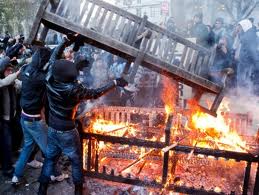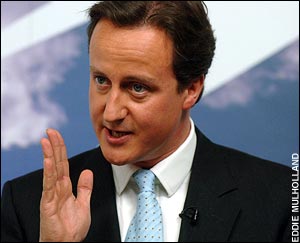UK Riots: An English Pantomime
The belated, arthritic response to England’s riots is a tragicomedy whose main players seem to embody long-cherished caricatures of Englishness.
Even as windows shattered and buildings blazed, looters formed an orderly British queue to steal from JD Sports – stopping to try on shoes before leaving.
The London mayor, the floppy and oft-befuddled Boris Johnson was chided for taking his time to return from holiday to a crisis-ridden capital.
After two nights of violence, Acting Metropolitan Police Commissioner Tim Godwin warned the wayward youths to just “stop it now.” He sounded like an exhausted uncle who had for some reason been entrusted with a pack of vaguely related upstarts who refused to go to bed.
He struck as farcical a figure as that cast by Prime Minister David Cameron who said the yobs were already captured in photos, on video and would be tracked down.
Overnight courts were set up to process hundreds of cases. Hooded youngsters emerged from the courthouse to finger-wagging as can only be done by the indignant Englishman – and woman. Yelling “shame!” outside of a courthouse in north London, one woman told journos they should be given hard time. “They should have a good think about what they’ve done.”
Bless her. No sooner had the judicial wheels begun spitting out fresh young convicts, than word got out of the mild sentences they were getting: community service orders or discharged entirely.
That changed, but England’s police, judiciary and above all, politicians were caught unaware. The riots have highlighted the blessed oblivion in which the English elite slumber, and the vast distance between Westminster, and the faraway impoverished areas it tries to govern.
In North America many of us have a tin ear for accents. But any Brit can hear in an instant the stark difference between Westminsterish and the variety of patois spoken on council estates.
While the politicians in the Square Mile are fond of abstractions like the Big Society, fairness and opportunity, England’s poor tend to use concrete terms, like ‘cheque,’ ‘bread’ and ‘milk.’
So when the two worlds caught a glimpse of each other last week, there emerged a combination of bewilderment, confusion and mutual contempt.
The country’s leaders have so far vowed to restore ‘law and order’ and bring the miscreants to justice. Cameron said gangs were ‘at the heart’ of the violence. But young and not-so-young, men and women, white as well as black all took part in the disorder.
And when an entire cross-section of society decides to trash their own communities, something deeper and more complicated is at work.
It may be too early to blame the riots on the latest cuts to social services, but it’s not a moment too soon to cite the degradation of Britain’s impoverished inner-city areas as being at least one contributing factor.
The gap between rich and poor has continued to widen, and those who boast of how rich and poor live cheek by jowl may now see that the juxtaposition of wealth and want can add insult to injury. Jobless young people with no stake in society have nothing to lose. Fed a constant media diet of corporate-sponsored bling that accentuates demand and desire, it’s little wonder that they’ll get out of hand when there’s nothing much to do. Their behaviour may be inexcusable, but it needs to be examined.
In households lacking educational or parental structure and worse – where drugs, alcohol, and abuse is rife – it’s perhaps a wonder the Realm is so seldom in turmoil.
But along with the doddering uncle, the finger-wagging aunty and the alarmingly violent upstart children, there is in England an inspiring tradition of analysis, debate and self-criticism.
Early attempts to dismiss the riots as simple thuggery are finally being supplanted by more nuanced analysis, which helps us begin to understand the causes and consequences of the latest eruption of social alienation, and may give an indication of where we go from here.



